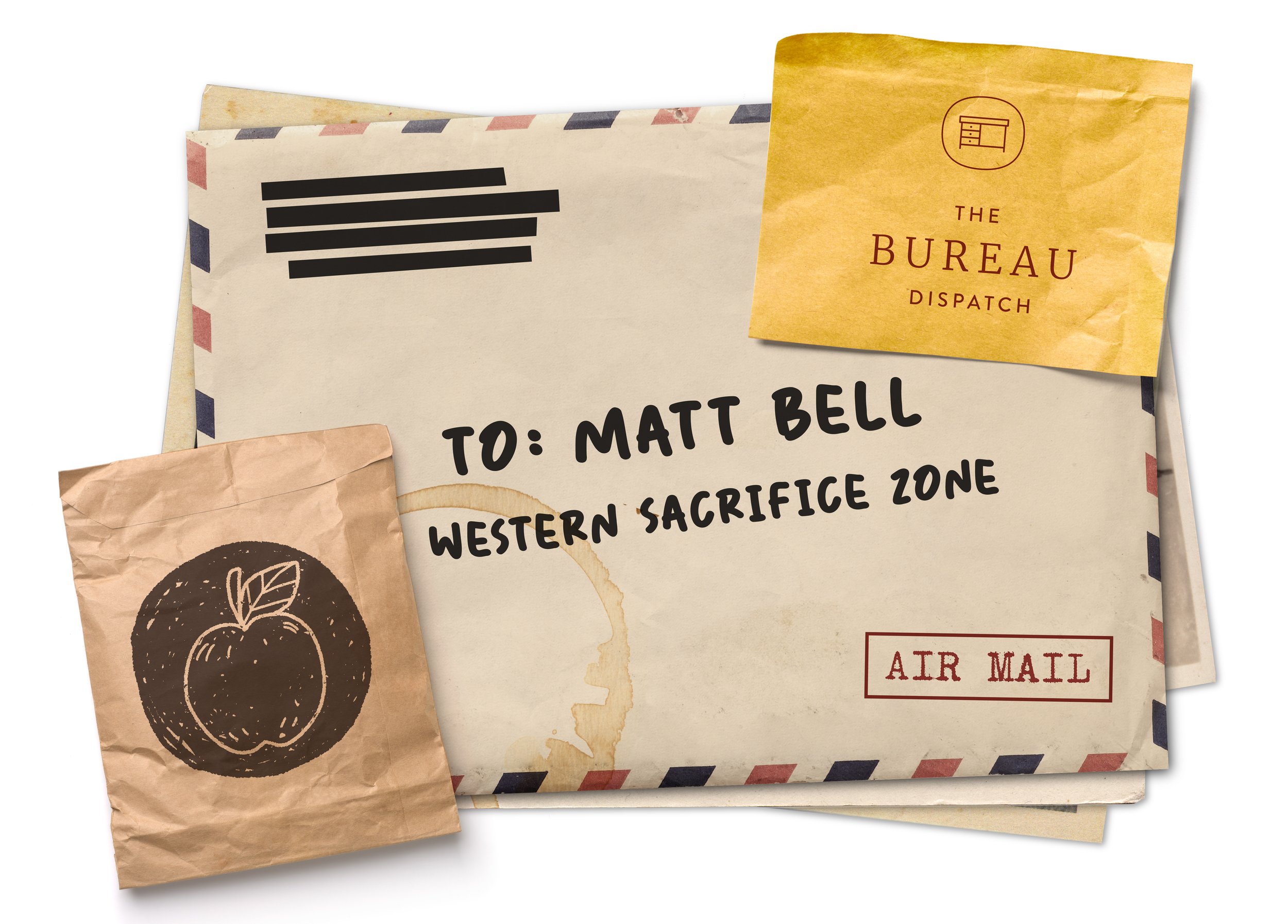Correspondence:
Matt Bell
Author, Appleseed (Custom House, 2021), Refuse to Be Done (Soho Press, 2022)
* * *
29 JUNE 2022, HONG KONGDear Matt,
I received your parcel this morning containing what appears to be a packet of apple seeds. I must confess that I do not have much of a green thumb, but I have planted them in terracotta pots on the balcony and I await anxiously to see what will become of them.
Your return address is marked Western Sacrifice Zone—what is it like out there, Matt? How long do you intend to stay?
I hope this letter reaches you.
Be well,
Jiksun
—P.S. In fifth grade recess I ate an apple, core and all, and my classmate Charlie announced right there and then that apple seeds contain cyanide and didn't I know these kinds of things? For three days, I worried about dying. Well—I'm still here and I continue to eat apples whole. But in the back of my mind, I will always worry.
* * *
DATE UNKNOWN, ADDRESS ILLEGIBLEDear Jiksun,
I’m glad the seeds arrived, and glad you didn’t eat them. Glad you didn’t need to try: that’s a good sign, I hope, that things are getting better where you are. The seeds traveled a long way to get to you. All that distance between you and me, sure, but also across a couple million years of evolution. (Not to be too grandiose about it.) The apples you’re growing right now are descended from trees that appeared in the Miocene, ten million years or so ago. Other plants in the same family grow berries to entice birds to do their bidding, but apple trees grow fruits too big to be easily dispersed by small flying creatures. The first apples available in North America were eaten by giant bears, giraffe-like camels, primitive wild horses, and other creatures. When you eat a grafted apple, you taste something humans cultivated for themselves; when you eat an apple grown from seeds, it could grow up to be any apple tree that ever existed. Maybe right there in your terracotta pot there’s a memory growing, a taste of something some strange megafauna last ate.
But of course the trees will outgrow the pots. You’re going to have to move them, sooner or later. Right now, you could move the pots wherever you go next; eventually, you’ll have to either commit to staying with the tree where you finally plant it or decide to abandon it to its fate when you move on.
You can’t really abandon a tree, of course. It’ll just do what it’s supposed to do, given sun and water and pollinators. Not that it’s all that easy to guarantee those conditions anymore either.
In the end, my guess is the tree stays put and you get moving. My guess is most of us are going to be on the move again, sooner or later, and for longer than we like. As for me, I’m always in danger of staying in one place too long. It’s easy to write characters who act, who get their asses in gear and start making choices. A little harder to break my own stubborn inertia. But sooner or later we all get pushed.
For now, I’m out of the Western Sacrifice Zone and back in the Midwest, working from the shade of the last apple trees left on my Grandma’s farm. There used to be a dozen or more in this orchard, full of fruit in the right time. There’s only two left now, but they mean the world to me. No apples yet this year–but who knows what’ll happen after I head west again.
Stay safe, and take care of those seeds! Who knows what future is in them.
Yours,
Matt
BIOGRAPHIESMatt Bell is the author most recently of the novel Appleseed (a New York Times Notable Book) published by Custom House in July 2021, in which the Western Sacrifice Zone features as a fictional setting. He is also the author of craft book Refuse to Be Done, a guide to novel writing, rewriting, and revision, published in early 2022 by Soho Press.
His writing has appeared in The New York Times, Esquire, Tin House, Fairy Tale Review, American Short Fiction, Orion, and many other publications. A native of Michigan, he teaches creative writing at Arizona State University.
* * *
Jiksun Cheung is EIC of The Bureau Dispatch.

